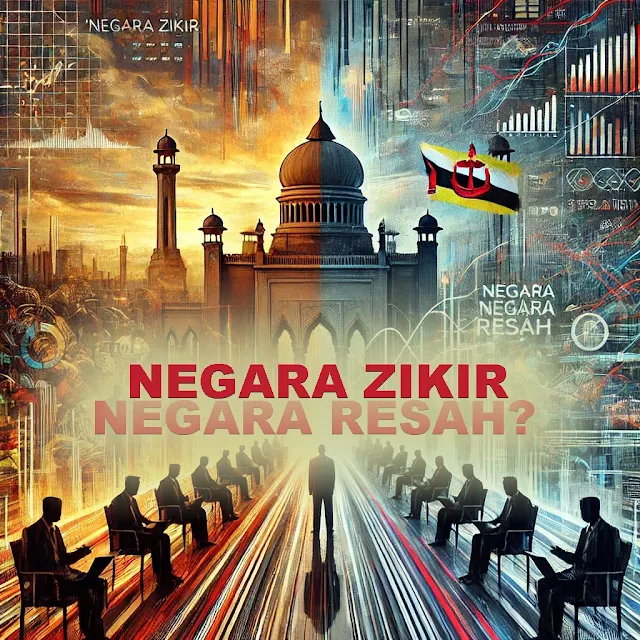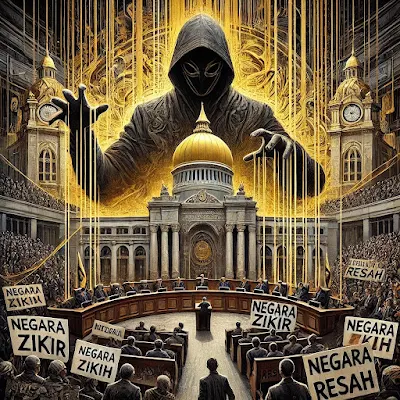When an oil-rich nation remains silent on a major offshore discovery, it raises more questions than answers. Is Brunei strategically assessing its energy future, or is its silence a sign of shifting national priorities in an evolving industry?
By Malai Hassan Othman
BANDAR SERI BEGAWAN – March 15, 2025 – Malaysia's offshore oil milestone, first announced on February 5, 2025, has resurfaced in social media discussions, but Brunei remains noticeably silent on the achievement.
Petronas announced the first oil production from the Gumusut-Kakap/Geronggong-Jagus East (GKGJE) Phase 4 offshore project.
The field, which includes two wells in Brunei’s waters and two in Malaysian waters, has begun feeding oil into Malaysia’s Gumusut-Kakap Floating Production System (FPS).
Brunei’s measured response raises questions about its long-term energy strategy.
Is this project simply a minor addition to Brunei’s hydrocarbon portfolio, or does its silence reflect deeper uncertainties about its energy policy?
The GKGJE development is rooted in the 2009 border agreement between Brunei and Malaysia, a landmark deal that resolved longstanding maritime disputes but also carried deeper historical and political implications.
The agreement officially settled competing claims over offshore resources, facilitating cooperative oil and gas exploration.
However, it was also seen as part of a broader diplomatic negotiation involving Brunei's historic territorial claims over Limbang, a district in Sarawak.
For decades, Brunei maintained its claim over Limbang, considering it a crucial part of its national territory.
The 2009 agreement reportedly included verbal assurances that Malaysia would recognise Brunei's sovereignty over disputed waters in exchange for Brunei relinquishing its claims over Limbang—an issue that has remained politically sensitive.
The oil unitisation arrangement, allowing for shared production from reservoirs straddling the maritime boundary, emerged from this wider geopolitical settlement.
While Malaysia has publicly framed the agreement as a win-win resolution, Brunei’s muted response to recent offshore oil developments may reflect lingering unease over the broader territorial compromises embedded in the deal.
Yet, despite being a direct stakeholder, Brunei’s government has neither issued statements nor acknowledged the project’s significance.
The Geronggong-Jagus East field, situated in Brunei’s waters, is part of the larger Gumusut-Kakap-Geronggong-Jagus East (GKGJE) complex, a deepwater production hub straddling the Malaysia-Brunei maritime boundary.
This suggests the field may be of lesser strategic importance in Brunei’s energy calculations.
Oil and gas remain central to Brunei’s economy, comprising over 50% of GDP and nearly 80% of government revenue.
The Geronggong-Jagus East Oil and Gas Field is expected to have a production design capacity of 36.5 million barrels of oil equivalent per year (boe/y) starting in 2026.
Brunei’s oil production has steadily declined, with current output at approximately 93,000 barrels per day (bpd), down from over 200,000 bpd in the early 2000s.
The country’s gas production has also faced pressure, with declining reserves affecting LNG export volumes.
With government expenditure heavily reliant on hydrocarbon revenue, this trend poses long-term fiscal challenges.
However, production declines and sluggish non-energy growth have made economic diversification a pressing challenge.
Energy analysts speculate that the muted response could indicate that Brunei sees minimal direct benefit.
Some experts argue that the revenue-sharing formula in the unitisation agreement disproportionately favours Malaysia, as the oil extracted will primarily be processed through Malaysia’s infrastructure.
Additionally, industry insiders suggest that Brunei’s share of this development may contribute less than 5% to national oil revenues, making it a relatively minor addition to the country’s broader energy portfolio.
Malaysia, as the lead operator through Petronas, is expected to generate a significantly larger share of revenue from GKGJE, as the majority of production flows through its infrastructure, securing long-term strategic gains in deepwater operations.
In contrast, Brunei’s stake may be comparatively smaller, with revenue gains insufficient to warrant high-profile recognition.
Others suggest that Brunei’s silence reflects a broader policy shift.
The government may prefer to downplay reliance on shared oil projects, particularly those tied to Malaysia’s infrastructure, to avoid reinforcing narratives of economic dependence.
Political observers note that Brunei has historically been reserved in announcing joint energy ventures.
Some diplomatic sources suggest that this silence is deliberate, as Brunei may not wish to highlight its reliance on Malaysia’s deepwater expertise and processing facilities.
Additionally, there are concerns within policy circles that a greater emphasis on joint development could undermine Brunei’s strategic ambitions of positioning itself as a sovereign energy producer rather than a junior partner in regional projects.
Sovereignty concerns and careful diplomatic balancing may also be factors in its reluctance to publicly highlight cross-border energy entanglements.
Brunei Shell Petroleum and PetroleumBRUNEI remain key players, but their role in GKGJE has been largely overshadowed by Malaysia’s active promotion of the project.
Malaysia, as the lead operator through Petronas, is expected to generate a significantly larger share of revenue from the GKGJE complex.
The Gumusut-Kakap field, located in Malaysian waters, has been a major asset for Malaysia, achieving peak production in 2016 and accounting for approximately 5% of Malaysia’s daily oil production.
It has recovered about 66.02% of its total recoverable reserves, making it a crucial energy contributor.
By comparison, the Geronggong-Jagus East field’s contribution to Brunei’s overall hydrocarbon output may be relatively modest.
The lack of fanfare suggests Brunei may not view this as a transformational energy asset.
With global oil prices fluctuating and energy transition pressures rising, Brunei faces a dilemma.
The recent Phase 4 development of the GKGJE project includes three oil-producing wells and one water injection well, with two wells located in Malaysian waters and two in Brunei waters.
This phase is expected to contribute approximately 21,000 barrels of oil equivalent per day (boe/d) to the overall output, reinforcing the project’s importance in the region.
Moving forward, Brunei may consider several strategic steps to bolster its energy sector and economic resilience.
Given that Malaysia's share of GKGJE revenue far outweighs Brunei’s, one potential move could be renegotiating future revenue-sharing terms, ensuring that more of its extracted oil is refined domestically rather than exported in raw form, or accelerating investment into alternative energy sectors to sustain fiscal stability.
Independent economic analysts warn that without significant diversification efforts, the country could face budgetary shortfalls as early as 2035.
To mitigate this, Brunei may look to establish stronger bilateral trade agreements, attract alternative foreign investors beyond Malaysia, or expand into renewable energy initiatives that could sustain long-term economic stability.
While the government has championed Vision 2035 as a roadmap for reducing hydrocarbon dependence, foreign direct investment (FDI) in non-energy sectors has remained sluggish.
The muted response to GKGJE may indicate a strategic reassessment of Brunei’s hydrocarbon sector and its place in the evolving regional energy market.
Is this offshore field a quiet win or a sign that its influence in regional energy markets is waning?
More than a month later, as the news circulates on social media, questions persist: Is this a stable energy future for Brunei, or merely a minor footnote in its economic trajectory?
What do you think? Is Brunei making a calculated move, or is it losing ground in the energy game? Join the conversation and share your insights. (MHO/03/2025)



.jpeg)



